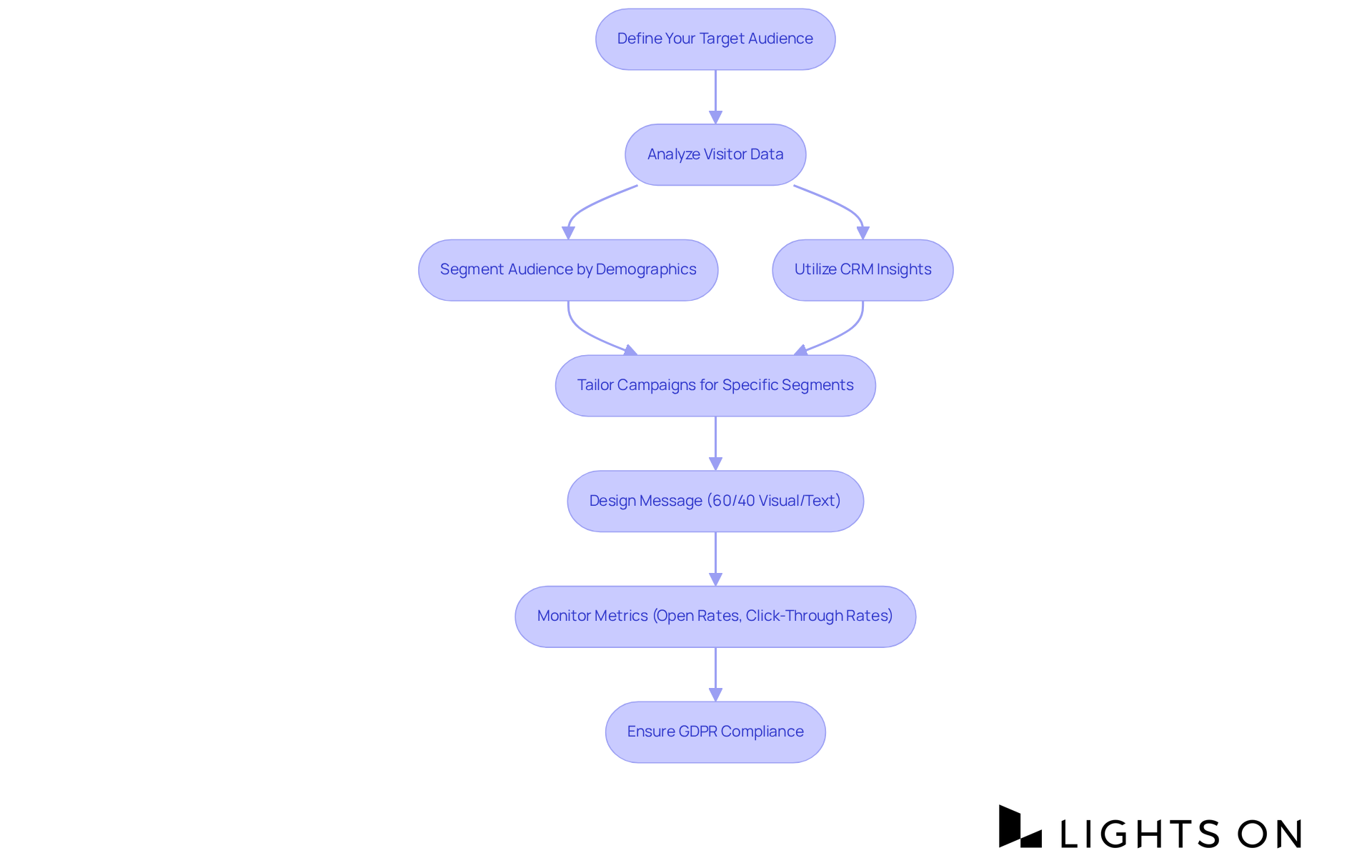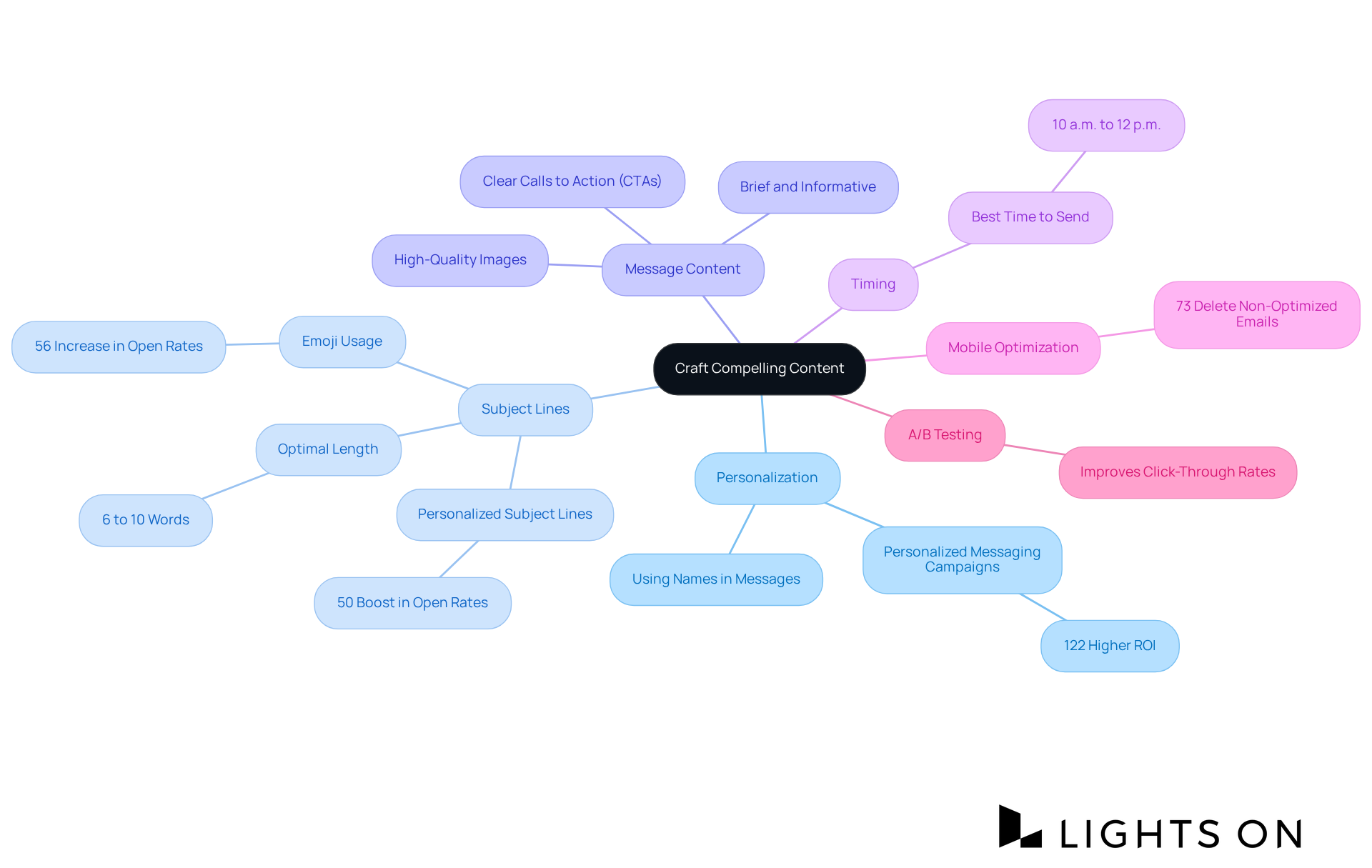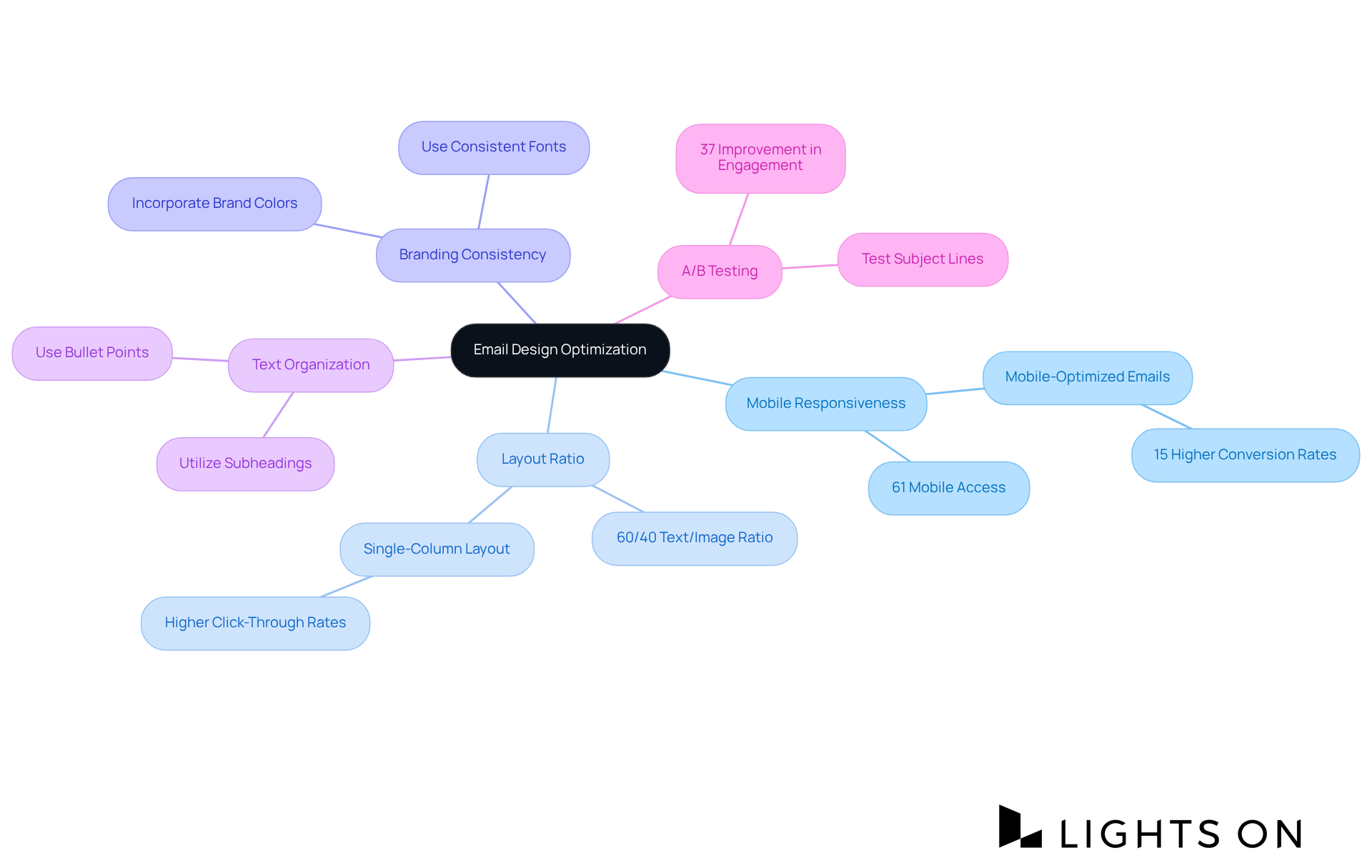Mastering hotel marketing emails to significantly boost guest engagement necessitates a strategic approach that includes:
It is crucial to recognize that segmenting audiences based on demographics and personalizing messages can greatly enhance engagement.
Furthermore, effective design coupled with continuous performance analysis ensures that marketing strategies remain relevant and impactful.
By implementing these tactics, hotel and restaurant owners can address their challenges head-on and foster deeper connections with their guests.
Crafting effective marketing emails is essential for hotels aiming to elevate guest engagement and drive repeat business. Understanding the nuances of their target audience and leveraging personalized content empowers hotels to create compelling communications that resonate with potential guests.
However, amidst the myriad of strategies available, how can hotel marketers ensure their emails stand out in an overcrowded inbox and truly connect with their audience? This article delves into best practices in hotel email marketing, offering insights into:
By implementing these strategies, hoteliers can enhance their email campaigns and maximize engagement.
To effectively define your , begin by analyzing your existing visitor data. Segment your audience based on key demographics such as age, location, and travel preferences. Utilizing customer relationship management (CRM) systems can provide valuable insights into past bookings and guest interactions.
For instance, if your hotel primarily attracts families, tailor your campaigns to showcase family-friendly amenities and activities, thereby enhancing their relevance. Furthermore, consider seasonal trends and special occasions that resonate with various segments, ensuring your communications are timely and engaging.
An optimal message design features a 60/40 division between visuals and text, which can significantly improve engagement. This focused approach not only enhances open frequencies but also fosters a stronger bond with your guests, greatly increasing the chances of repeat reservations.
By applying these segmentation strategies and customizing your hotel marketing email, hotels can create tailored experiences that resonate with their audience, ultimately driving engagement and revenue. Moreover, monitoring essential metrics such as open rates and click-through rates is vital for evaluating the success of your marketing campaigns. Lastly, ensure compliance with data privacy regulations like GDPR to build trust with your guests.

Creating engaging communication content begins with crafting compelling subject lines that ignite curiosity and drive opens. Personalization techniques, such as addressing recipients by name and referencing their previous stays or preferences, significantly enhance engagement. In fact, personalized messaging campaigns achieve 122% higher ROI compared to generic strategies, making this approach vital for marketing in the hospitality sector.
The message content should be brief yet informative, highlighting special promotions, upcoming events, or distinctive experiences your establishment provides. Incorporating high-quality images alongside clear calls to action (CTAs) directs visitors toward booking or exploring more. For example, a message promoting a weekend escape could feature a stunning image of your hotel's pool area, along with a limited-time discount code. This approach not only entices guests but also instills a to act.
Recent trends indicate that messages with personalized subject lines can boost open rates by up to 50%, while subject lines that include emojis have been shown to increase open rates by 56%. Furthermore, sending messages between 10 a.m. and 12 p.m. can enhance engagement, as this is regarded as the ideal time for delivery. It's also crucial to guarantee mobile optimization, as 73% of users remove messages that do not display correctly on mobile devices.
A/B testing subject lines can result in significant enhancements in click-through rates, enabling accommodations to refine their messaging strategies. Finally, accommodation proprietors should be wary of deceptive subject lines, as about 69% of recipients classify messages as spam based solely on the subject line. By utilizing these methods, accommodations can improve their marketing outreach and build stronger relationships with prospective visitors.

To enhance your communication layout for hotel marketing, prioritize , as over 61% of messages are accessed on smartphones. As Theo states, 'Over 61% of messages are accessed on mobile devices, making mobile-first designs essential.' A clean layout that balances text and images is crucial; maintain a 60/40 text-to-image ratio to enhance deliverability and avoid clutter that can overwhelm readers.
Furthermore, consistency in branding is vital, so incorporate your brand's colors and fonts to enhance recognition. In addition, utilize bullet points and subheadings to break up text, making information easily digestible.
Remember, effective communication marketing is about delivering a seamless experience that resonates with your audience.

To effectively assess the performance of your messaging campaigns, it is crucial to monitor key metrics such as:
By utilizing analytics tools, you can collect valuable information on how recipients engage with your messages, including which links are clicked most often. This data not only helps identify what content resonates with your audience but also highlights areas that may require adjustment.
For example, if you observe a low CTR on emails promoting special offers, consider revising either the offer itself or the manner in which it is presented. Furthermore, regularly reviewing these metrics after each campaign will inform your future strategies, ensuring continuous improvement and fostering better engagement with your guests.

Mastering hotel marketing emails is essential for enhancing guest engagement and driving revenue. By focusing on defining the target audience, crafting compelling content, optimizing email design, and analyzing performance metrics, hotels can create impactful email campaigns that resonate with their guests. This strategic approach not only fosters stronger connections with potential visitors but also increases the likelihood of repeat bookings.
Key insights from the article highlight the importance of:
Furthermore, A/B testing and monitoring key performance metrics such as open rates and click-through rates are crucial for refining email strategies and ensuring ongoing improvement in engagement levels.
In a competitive hospitality landscape, implementing these best practices can significantly enhance a hotel's marketing efforts. By prioritizing guest-centric communication and leveraging data-driven insights, hotels can not only boost engagement but also cultivate lasting relationships with their guests. Embracing these strategies will ultimately lead to a more successful email marketing approach, ensuring that hotels remain top-of-mind for travelers seeking their next memorable experience.
How can I define my target audience for email campaigns?
To define your target audience, analyze your existing visitor data and segment your audience based on key demographics such as age, location, and travel preferences. Utilizing customer relationship management (CRM) systems can provide insights into past bookings and guest interactions.
What should I consider when tailoring email campaigns?
Consider the specific characteristics of your audience, such as if your hotel attracts families, and tailor your campaigns to highlight family-friendly amenities and activities. Additionally, take into account seasonal trends and special occasions that resonate with different segments.
What is the optimal message design for email campaigns?
An optimal message design features a 60/40 division between visuals and text, which can significantly improve engagement. This balance enhances open rates and fosters a stronger bond with guests, increasing the chances of repeat reservations.
How can segmentation strategies benefit hotel marketing emails?
By applying segmentation strategies and customizing your marketing emails, hotels can create tailored experiences that resonate with their audience, ultimately driving engagement and revenue.
What metrics should I monitor to evaluate the success of my email marketing campaigns?
It is vital to monitor essential metrics such as open rates and click-through rates to evaluate the success of your marketing campaigns.
Why is compliance with data privacy regulations important in email marketing?
Ensuring compliance with data privacy regulations like GDPR is important to build trust with your guests and protect their personal information.
Transform your group booking strategies with Lights On and watch your occupancy soar.